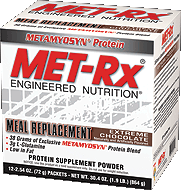
November 1, 2009
Whey vs. Casein: Making Sense of Protein Supplements
Whey vs. casein. Which one is best? I get asked this question on a daily basis. Here’s the scoop…
Both whey and casein are complete protein sources, containing all the essential amino acids. Either one can be used to satisfy your daily protein requirements. And although they are milk-based proteins, most of the lactose is removed during extraction so they shouldn’t pose much of a problem for the lactose intolerant. Just add them to water, juice or whole foods for a power-packed meal.

Although whey and casein have similar amino acid profiles, however, there are inherent differences between the two. Perhaps the most relevant difference is that they digest at different speeds. You see, whey is a “fast acting” protein, meaning it’s rapidly absorbed into circulation, generally within about an hour’s time. Casein, on the other hand, is a slow acting protein. It ‘clumps up’ when subjected to stomach acids, dramatically slowing down absorption. So how can you use this information…?
Because it is rapidly assimilated, whey is perfect as a pre and/or post-workout protein source. It reaches your muscles quickly, thereby expediting repair. And since your muscles are primed for anabolism during and after a training session, virtually all of the protein will be utilized for rebuilding with little wastage. In the pre-workout period, aim for about one-tenth of a gram of whey per pound of bodyweight (i.e. a woman weighing 120 pounds would need about 12 grams of whey) while post-workout the amount should be about ¼ gram of protein per pound of bodyweight (the same 120 pound woman would need about 30 grams of whey). Interestingly, some studies indicate that mixing in casein can provide an additive effect on protein synthesis in the post-workout period. This needs further study before conclusions can be drawn.
Conversely, casein is better as a general protein source during ‘non-workout’ periods, either as a meal replacement or simply to meet daily protein requirements. It is particularly good to take before bedtime. During sleep, your body becomes catabolic, breaking down muscle tissue for their amino acids. Since casein takes roughly three to four hours to be fully assimilated, it provides the body with a steady supply of aminos throughout much of the night, significantly limiting protein breakdown. This results in a higher net daily nitrogen balance, leading to better muscle retention.
Remember, though, that taking whey and casein over and above your normal protein requirements won’t do any good from a muscle building standpoint. Unfortunately, protein cannot be stored in your body for future use. When you consume more than what your body can handle (generally about one gram per pound of bodyweight a day), the rest will simply be excreted (or stored as fat, if your calories are in excess of what you expend).
Stay Fit!
Brad
2 Comments
RSS feed for comments on this post.
Sorry, the comment form is closed at this time.





 Entries (RSS)
Entries (RSS)




I get a great whey protein isolate that I love for my pre- and post- workout shakes. I am looking for a good casein protein to take before bed, though. Do you have any recommendations?
Comment by Alex — November 2, 2009 @ 9:05 pm
After loosing weight, gaining muscles would be a great next step to tone your body.
Thanks Brad for the Medical Information you have shared!
Comment by jason ferruggia — November 5, 2009 @ 4:37 pm